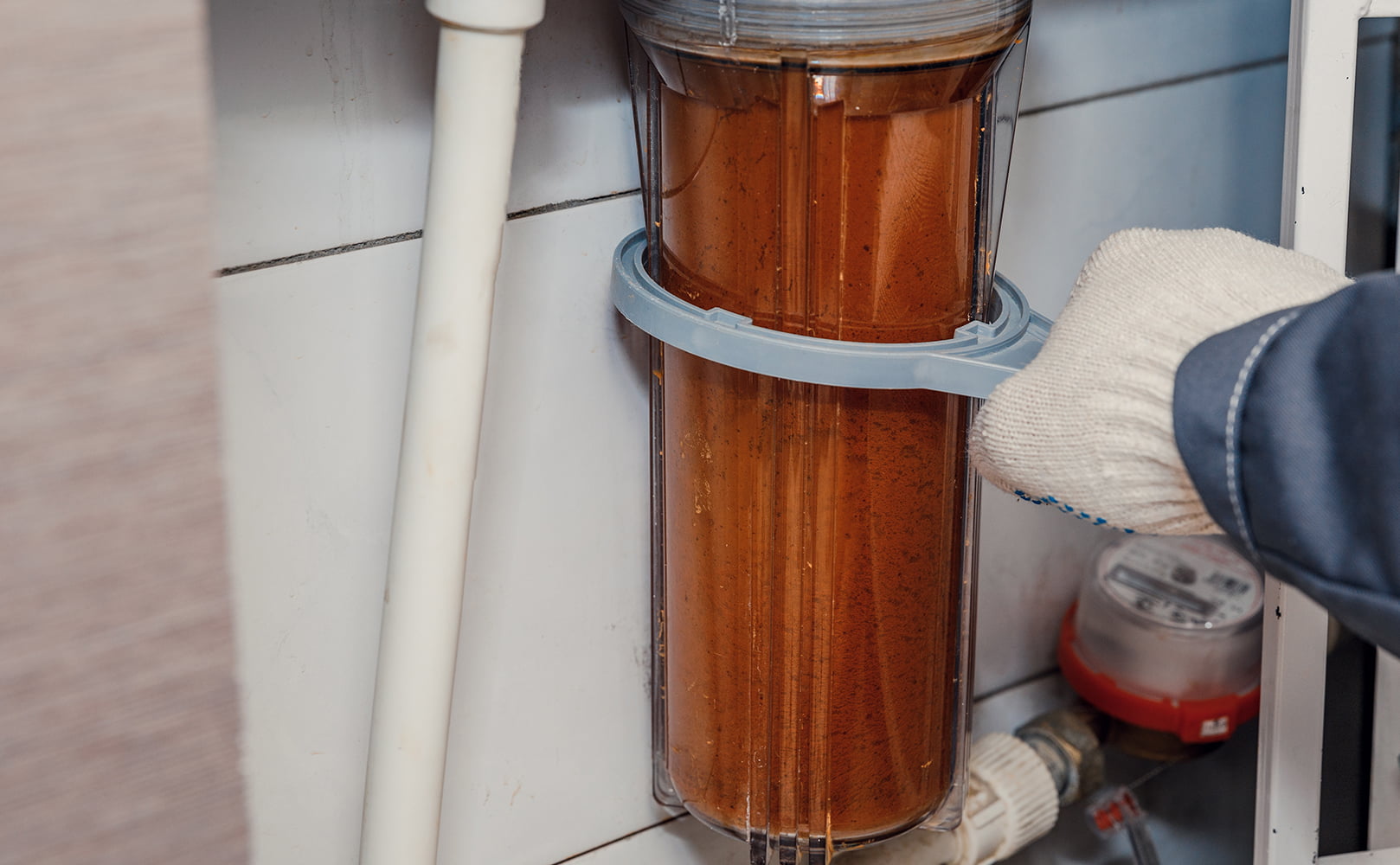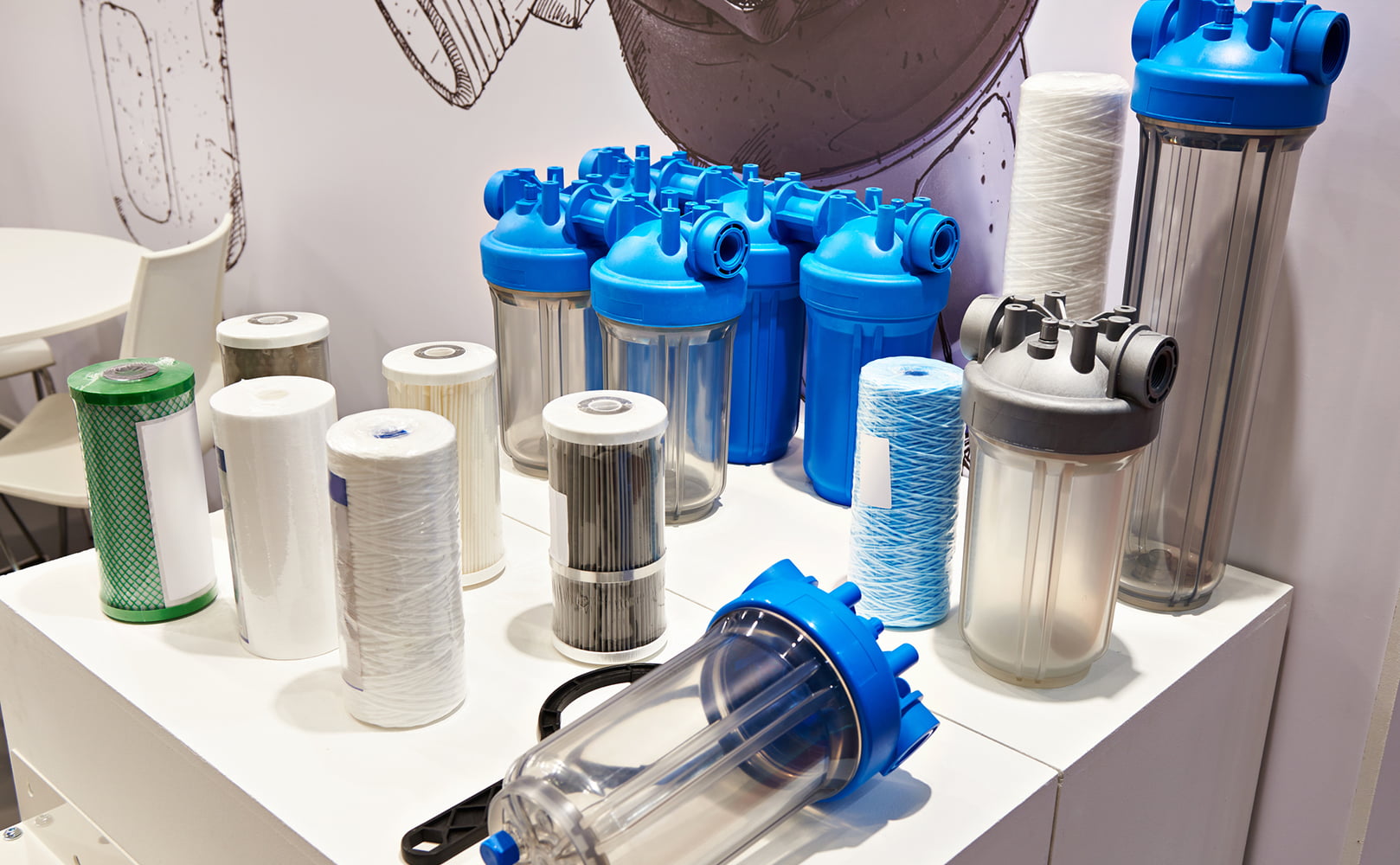Help, My Whole House Water Filter Gets Dirty Fast!
Written by: Gene Fitzgerald // Last Updated: Apr 14, 2023
This page may contain affiliate links. If you buy a product or service through such a link we earn a commission at no extra cost to you. Learn more.
Whole house water filters are designed to capture contaminants and remove them from your water supply. This means that they will eventually get too dirty to function properly, which is when you need to replace filter cartridges.
However, if you find yourself swapping out those cartridges more often than the manufacturer’s specifications estimate, you may have a problem with your water supply affecting the performance of the filter.
So, what can you do when your whole house water filter is getting dirty fast?
Key Takeaways
Your whole house water filter might be getting dirty fast due to one of these reasons:
- Your well – recent construction work on or near your well could cause temporary issues with the water supply. Disconnect your whole house filter and clean it.
- Plumbing or pressure tank – Pipes need to be replaced every once in a while. A pressure tank lasts about 15 years.
- Heavy rain or drought – Sudden weather changes can have negative impacts on your well water level and quality.
- Fine filters – Very fine filters capture more particles and need to be replaced more often, especially when used on heavily polluted water supplies.
- High water consumption – If you live in a larger household, your filter may depreciate faster as you are using more water.
Causes for a Whole House Water Filter Getting Dirty Fast
If your whole house water filter gets dirty faster than expected, this could boil down to several root causes. It’s important to investigate each one that’s relevant to your situation. Don’t stop your verification as soon as you’ve found a problem – there may be additional ones down the line.
It May Be Your Well
If you’ve had any work done on your well recently, this could cause temporary issues with your water supply. In that case, the problem should go away on its own after some time – it could be a few weeks, but in most cases the issue shouldn’t persist for more than a few days. You can also try to flush your system for a quick fix – more on that below.
You might also have a broken pipe in your well, allowing contaminants like dirt to enter. This can be a difficult fix, depending on where exactly the issue lies.
Finally, you need to make sure that your well’s water level hasn’t gone too low. Usually, there will be a reasonable buffer of water between the pump and the bottom of the well, preventing any dirt from getting sucked by the pump because it settles down on its own. If the water level gets too low, your pump may be dangerously close to the bottom, allowing dirt to enter it.
It May Be Your Plumbing
How old is your home’s plumbing? If your pipes haven’t been changed in a while, there may be a leak along the system that allows contaminants to enter the water supply. Depending on the size of your home, it can take a while to identify the exact location of the issue. Working with an expert is recommended in this case.
Have You Replaced Your Pressure Tank?
Under most circumstances, your pressure tank should be replaced roughly every 15 years. This might be different for your specific water supply, so it’s best to check with a specialist. In any case, if your tank is overdue for a replacement, this can be one reason for finding excessive dirt in your water supply.
You should look into installing additions to your plumbing system that can prolong the lifespan of your tank, such as a pressure valve and an air volume control system.
Has There Been Heavy Rain or Drought?
Sudden changes in the weather can also cause problems. Both heavy rain and drought can negatively impact the operation of your well, as your water level will be above or below average – and what’s recommended for the optimal performance of the pump and other components.
In that case, all you can do is wait it out. However, if you’re faced with a long period of drought, you should check if you can adjust the level of your water pump to temporarily accommodate for that.
Micron Rating: Are You Using Too Small of a Filter?
If you’re using a whole house water filter with a very small micron rating, it will capture more and smaller particles. This is a good idea if you’re dealing with fine sediment that doesn’t get caught by more coarse filters, but it can also degrade the durability of your filter in the long term.
Filters with small micron ratings typically need to be replaced more often when used in heavily polluted environments.
How Much Water Are You Using?
Do you live alone or in a larger household with multiple inhabitants? It’s possible that you’re simply consuming a lot of water and running through each filter faster than its average expected lifetime.
Remember that those filter life estimates are based on average water consumption. If you’re using too much water, you may have to replace your filters more frequently and there’s not much you can do about that.
Solutions
Here are some options to consider if you’ve identified at least one of the above issues. Remember, always consult an expert if you’re planning to do anything that could compromise the integrity of your plumbing system!
Remove Filter and Try to Flush
If you’ve had any construction work done recently, or any kind of work that could result in additional contaminants being deposited into your well, you should try disconnecting your filter and flushing the whole system. In some cases, the problem will go away after a single complete flush. If it doesn’t, you may be dealing with additional problems in your supply.
Have Issues Repaired
If the issue is caused by damage to your water supply, you need to have it repaired. This is rarely a DIY job and almost always requires a qualified specialist. Otherwise, you risk causing even more damage to your plumbing and having even more contaminants deposited in your water supply.
Test Your Water
Have you ever tested your water quality? It’s possible that you’re simply dealing with water that’s too dirty by default. In this case, it will cause additional wear on whole house filters and decrease their lifetime faster than intended. There’s not much you can do here, other than to take note and make sure to replace your filters more often in the future.
Add Additional or Larger-Micron Filter
If your water test shows a high level of contamination in the supply, you might want to add a pre-filter to capture some of the additional contaminants before they reach the main whole house filter. You could also use a filter with a larger micron rating to prevent it from getting clogged up as fast. Keep in mind that this will result in more contaminants making their way into your water supply, unless you combine multiple filtration steps.
If you have any questions about dirty whole house water filters please don’t hesitate to leave a comment below!
Information provided on BOS is for educational purposes only. The products and services we review may not be right for your individual circumstances.
We adhere to strict editorial guidelines. Rest assured, the opinions expressed have not been provided, reviewed, or otherwise endorsed by our partners – they are unbiased, independent, and the author’s alone. We fact-check all content for accuracy. It is accurate as of the date posted and to the best of our knowledge.



